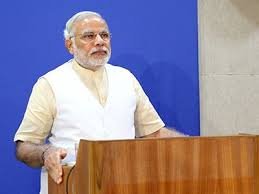PM Modi Breaks Silence After Operation Sindoor: India Signals a Bold Shift in Anti-Terror Strategy
India’s national security strategy has entered a new phase following Operation Sindoor, a precision military response to the recent terror attack in Pahalgam, Kashmir. In his first public reaction, Prime Minister Narendra Modi delivered a powerful, structured message that reframed India’s posture against terrorism — focusing not just on retaliation, but on long-term strategic consequences.
“This is not the end. We’ve only suspended further action — not ruled it out.” – PM Modi
What Triggered Operation Sindoor?
The operation was prompted by the Pahalgam terror attack, where heavily armed terrorists ambushed a convoy of Indian forces, resulting in the death of several personnel. The attack was traced back to Pakistan-based terror groups, sparking widespread anger and calls for immediate action.
Within 72 hours, India launched Operation Sindoor, targeting nine high-value terror hubs across Pakistan-occupied Kashmir (PoK) and Pakistan’s interior regions. Over 100 terrorists were neutralized, according to senior defense sources.
What PM Modi Said: Key Statements from His Address
In a nationally televised statement, PM Modi made the following key remarks:
- “India will strike at the roots of terrorism – wherever it exists, wherever it hides.”
- “The time for warnings is over. This is a message, not just a mission.”
- “Pakistan must decide — will it continue sheltering terrorism, or stand with global peace?”
- “When the world sees terrorists being given state funerals in Pakistan, the truth becomes undeniable.”
These remarks reflect a strategic shift from reactive defense to proactive counter-terror doctrine.
What Is Operation Sindoor? A Tactical Overview
| Aspect | Details |
|---|---|
| Name | Operation Sindoor |
| Trigger | Pahalgam terror attack (Indian troops ambushed) |
| Response Time | Less than 72 hours |
| Targeted Regions | Pakistan-occupied Kashmir and interior Pakistan |
| Terror Camps Hit | 9 confirmed terror training/logistics hubs |
| Terrorists Neutralized | 100+ (based on intelligence sources) |
| Indian Losses | None reported in strike; no damage to Indian side |
This rapid and calculated action indicates that India had pre-validated strike plans and real-time intelligence, marking a departure from the slower diplomatic processes of the past.
Direct Naming of Pakistan: A Diplomatic and Public Shift
While India has long hinted at Pakistan’s role in fostering terrorism, this address marked a rare occasion when the Prime Minister explicitly named Pakistan and referenced military honors given to terrorists.
“Pakistan cannot pretend anymore. The world saw what it needed to see.”
This is in response to video evidence of Pakistani military officials attending the funerals of known terrorists, giving rise to international condemnation.
A New Doctrine: Terror and Talks Cannot Coexist
PM Modi made it clear that any peace dialogue with Pakistan is off the table unless terrorism ends.
“There will be no talks with Pakistan except on two matters: ending terrorism and returning PoK.”
This aligns with India’s revised national security doctrine, which includes:
- Zero tolerance to cross-border terror
- No trade or dialogue without cessation of terrorist activity
- Surgical and deep-strike capabilities as deterrence tools
What the Armed Forces Achieved: A Statement of Capability
India’s armed forces executed the operation with precision and minimal risk, showcasing upgraded surveillance, targeting, and air-to-ground coordination.
“To every Indian citizen — your soldiers have stood tall. They have shown resolve, restraint, and readiness.” – PM Modi
The government praised the military for its coordination and effectiveness. According to sources, the operation included high-altitude drone surveillance, laser-guided bombs, and stealth entries into Pakistani airspace — echoing lessons learned from the 2016 surgical strikes and 2019 Balakot airstrikes.
Global Response: Supportive But Cautious
India’s actions and Modi’s address were followed closely by international partners.
- United States: “We support India’s right to defend itself and expect Pakistan to dismantle terror networks.”
- European Union: “This is a serious security matter. Pakistan must ensure its territory is not used to fuel terrorism.”
- France & Israel:
Quietly supportive, praising India’s precision and restraint.
While India received broad diplomatic backing, global powers have also urged caution and de-escalation to prevent escalation into open conflict.
Public Sentiment: A United Nation Behind the Forces
Across party lines and communities, citizens expressed solidarity with the armed forces. In an unexpected move, opposition leaders joined in support:
“India stands united against terrorism. This must go beyond politics.” – Rahul Gandhi
On social media, hashtags like #OperationSindoor, #PoKStrike, and #IndiaStrikesBack began trending within hours. Several ex-servicemen and strategic analysts hailed this as a turning point in India’s anti-terror strategy.
What This Means for India’s Future Security Policy
India’s position is clear: terror will be met with precision, not patience. The new policy playbook is expected to include:
- Pre-validated strike plans for future attacks
- Stronger partnerships with intelligence allies
- Greater transparency in showcasing Pakistan’s role
- Economic sanctions or leverage where necessary
FAQs: What You Need to Know
Q: Will there be more strikes like Operation Sindoor?
A: The PM’s statement suggests further action is not off the table. Future strikes will likely depend on the intelligence and geopolitical developments.
Q: How has the global community reacted?
A: Mostly supportive of India’s right to self-defense. There is a push for Pakistan to dismantle its terror infrastructure.
Q: Is India at risk of a full-blown war with Pakistan?
A: As of now, both countries are maintaining a defensive posture. India’s strikes were limited and strategic, not aimed at civilian areas.
Q: Why is it called Operation Sindoor?
A: Symbolically, ‘Sindoor’ represents sacrifice and resolve in Indian tradition. The naming likely reflects the operation’s emotional and patriotic significance.

